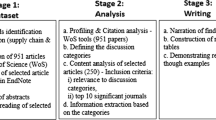Abstract
Predictable and unpredictable disruptions of supply chains are omnipresent. This has led to an increased interest in methods and tools to handle disruptions. A possible solution to reduce the impact of disruptions to organizations is the implementation of a business continuity management system (BCMS). The objective of a BCMS is to continue the delivery of products and services within an acceptable time frame at predefined capacity during disruption. This manuscript, therefore, presents the content of a BCMS referring to the well-recognized standards ISO 22301 and the corresponding standard of the Federal Office for Information Security (BSI) in Germany. The central element of an BCMS is the business impact analysis and for this reason it is discussed in detail. Finally, the BCMS is set into the broader field of supply chain resilience. It is important to consider the supply side to achieve resilience.
Access this chapter
Tax calculation will be finalised at checkout
Purchases are for personal use only
Similar content being viewed by others
References
Allianz Global Corporate & Specialty. (2021). Allianz risk barometer - identifying the major business risks for 2021. https://www.agcs.allianz.com/news-and-insights/reports/allianz-risk-barometer.html.
BSI-100-4. (2009). BSI Standard 100–4- Business Continuity Management. Federal Office for Information Security (BSI).
BSI-CD-200-4. (2021). BSI-Standard 200–4- Business Continuity Management (Community Draft). Bonn: Bundesamt für Sicherheit in der Informationstechnik.
Chen, L.; Dui, H.; Zhang, C. (2020). A resilience measure for supply chain systems considering the interruption with the cyber-physical systems. Reliability Engineering and System Safety (199).
Ernst, A. (2020). Polizei ermittelt nach Hacker-Angriff in einem Todesfall. Sueddeutsche Zeitung, https://www.sueddeutsche.de/panorama/duesseldorf-uniklinikum-erpressung-hacker-angriff-1.5035140
Falasca, M.; Zobel, C. W.; Cook D. . (2008). A decision support framework to assess supply chain resilience. Proceedings of the 5th International ISCRAM Conference, 596–605.
Garatti, A.; Dib, G. (2020). Global supply chain survey - In search of post Covid-19 resilience. Euler Hermes, Allianz.
ISO/IEC-27001. (2013). Information Technology - Security Techniques - Information Security Management Systems - Requirements. International Organization for Standardization.
ISO/TS-22317. (2015). Societal Security - Business Continuity Management Systems - Guidelines for Business Impact Analysis (BIA). International Organization for Standardization.
ISO/TS-22318. (2015). Societal Security - Business Continuity Management Systems - Guidelines for Supply Chain Continuity. International Organization for Standardization.
ISO-22301. (2019). Security and Resilience - Business Continuity Management Systems - Requirements. International Organization for Standardization.
ISO-22316. (2017). Security and Resilience - Organizational Resilience - Principles and Attributes. International Organization for Standardization.
ISO-28001. (2007). Security Management Systems for the Supply Chain - Best Practices for Implementing Supply Chain Security, Assessments and Plans - Requirements and Guidance. International Organization for Standardization.
ISO-Survey. (2019). 1._ISO_Survey_2019_results_-_Number_of_certificates_and_sites_per_country_and_the_number_of_sector_overall. https://isotc.iso.org/livelink/livelink?func=ll&objId=18808772&objAction=browse&viewType=1
ITIL-4. (2019). ITIL Foundation-ITIL (4th ed.). AXELOS Limited.
Krauss, C. (2021). Hackers and Climate Change Threaten U.S. Energy Independence. New York Times. https://www.nytimes.com/2021/05/18/business/energy-environment/colonial-pipeline-security-weather.html
Montshiwa, A. L., Nagahira, A., & Ishida, S. (2016). Modifying business continuity plan (BCP) towards an effective auto-mobile business continuity management (BCM): A quantitative approach. Journal of Disaster Research, 11, 691–698.
Namdar, J., Torabi, S., Sahebjamnia, N., & Pradhan, N. (2021). Business continuity-inspired resilient supply chain network design. International Journal of. Production Research, 59, 1331–1367.
Tang, C., & Musa, S. (2011). Identifying risk issues and research advancements in supply chain risk management. International Journal of Production Economics, 133, 25–34.
Tuczek, F., & Wakolbinger, T. (2018). A meta-analysis of sustainable supplier selection approaches. In H. Qudrat-Ullah (Ed.), Innovative Solutions for Sustainable Supply Chains (pp. 55–79). Springer International Publishing AG.
Tuczek, F., Castka, P., & Wakolbinger, T. (2018). A review of management theories in the context of quality, environmental and social responsibility voluntary standards. Journal of Cleaner Production, 176, 399–416.
Wieteska, G. (2018). Business Impact Analysis of supply chain disruptions. 8th International Conference on Management, Economics and Humanities, 110–119). Barcelona, Spain.
Wieteska, G. (2018b). The domino effect- disruptions in supply chains. LogForum, 14, 495–506.
Ziady, H. (2021). Global shipping was in chaos even before the Suez blockage. Shortages and higher prices loom. CNN. https://edition.cnn.com/2021/03/26/business/global-shipping-supply-chains/index.html
Author information
Authors and Affiliations
Editor information
Editors and Affiliations
Appendix
Appendix
Table 7.1 provides an overview of ISO standards discussed in this paper. Also relevant to business continuity management is BSI 100-4 (this standard is currently under revision)
Rights and permissions
Copyright information
© 2022 The Author(s), under exclusive license to Springer Nature Switzerland AG
About this chapter
Cite this chapter
Tuczek, F. (2022). Enhancing Supply Chain Resilience Through Incorporating Business Continuity Management Systems. In: Kummer, S., Wakolbinger, T., Novoszel, L., Geske, A.M. (eds) Supply Chain Resilience. Springer Series in Supply Chain Management, vol 17. Springer, Cham. https://doi.org/10.1007/978-3-030-95401-7_7
Download citation
DOI: https://doi.org/10.1007/978-3-030-95401-7_7
Published:
Publisher Name: Springer, Cham
Print ISBN: 978-3-030-95400-0
Online ISBN: 978-3-030-95401-7
eBook Packages: Business and ManagementBusiness and Management (R0)




